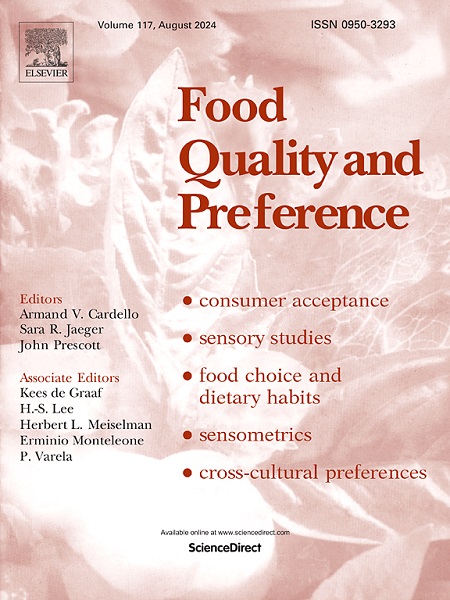不仅仅是一种感觉:EmoSemio问卷的开发,以评估新加坡和美国细胞培养肉标签术语引起的情绪
IF 4.9
1区 农林科学
Q1 FOOD SCIENCE & TECHNOLOGY
引用次数: 0
摘要
细胞培养肉(CCM)的批准销售受到媒体、消费者和利益相关者的广泛讨论,新加坡将于2020年率先批准,美国将于2023年批准。在这两个国家,使用不同的标签术语来描述这些产品,使消费者难以做出明智的选择。虽然消费者调查已经评估了标签术语的吸引力和透明度,但不同标签术语引起的情绪仍然不清楚。我们着手通过开发和应用CCM标签术语的产品特定情感配置文件来缩小这一差距。在这项分为两部分的研究中,我们首先创建了一个包含17个条目的EmoSemio问卷,以概括不同CCM标签术语引起的情绪范围,然后在893名美国和424名新加坡参与者中进行了在线调查。我们发现,包括“细胞”和“实验室培养”在内的词汇在这两个国家都能引起更大的负面情绪。在这两个国家,“清洁肉”一词唤起了最大的积极效价情绪,然而,当被提示CCM的定义时,新加坡和美国的参与者都没有选择它作为一个代表性的标签术语。我们的研究结果为标签术语如何影响美国和新加坡的情绪唤起提供了见解,有助于对CCM感知的跨文化研究。特定产品EmoSemio问卷的开发允许未来的研究评估CCM标签术语引起的情绪。本文章由计算机程序翻译,如有差异,请以英文原文为准。
More than a feeling: Development of an EmoSemio questionnaire to evaluate emotions evoked by cell-cultivated meat label terms in Singapore and the USA
Approval of cell-cultivated meat (CCM) for sale is widely discussed by media, consumers, and stakeholders, with Singapore being first to approve in 2020, followed by the USA in 2023. In both countries, different label terms are used to describe these products, making it difficult for consumers to make informed choices. While consumer surveys have evaluated label term appeal and transparency, emotions evoked by different label terms remain unclear.
We set out to close this gap through the development and application of a product-specific emotional profile for CCM label terms. In this two-part study, we first created a 17-item EmoSemio questionnaire to encapsulate the range of emotions evoked by different CCM label terms, then tested it with 893 USA and 424 Singaporean participants in an online survey.
We found terms including the words ‘cell-’ and lab-grown to evoke significantly greater negative emotions in both countries. In both countries, the term clean meat evoked the greatest positive valence emotions, however, when prompted with the definition of CCM participants did not choose it as a representative label term in either Singapore or the USA.
Our findings provide insights on how label terms effect emotions evoked in both the USA and Singapore, contributing to cross-cultural research on CCM perception. The development of a product-specific EmoSemio questionnaire allows future research to assess the emotions evoked by CCM label terms.
求助全文
通过发布文献求助,成功后即可免费获取论文全文。
去求助
来源期刊

Food Quality and Preference
工程技术-食品科技
CiteScore
10.40
自引率
15.10%
发文量
263
审稿时长
38 days
期刊介绍:
Food Quality and Preference is a journal devoted to sensory, consumer and behavioural research in food and non-food products. It publishes original research, critical reviews, and short communications in sensory and consumer science, and sensometrics. In addition, the journal publishes special invited issues on important timely topics and from relevant conferences. These are aimed at bridging the gap between research and application, bringing together authors and readers in consumer and market research, sensory science, sensometrics and sensory evaluation, nutrition and food choice, as well as food research, product development and sensory quality assurance. Submissions to Food Quality and Preference are limited to papers that include some form of human measurement; papers that are limited to physical/chemical measures or the routine application of sensory, consumer or econometric analysis will not be considered unless they specifically make a novel scientific contribution in line with the journal''s coverage as outlined below.
 求助内容:
求助内容: 应助结果提醒方式:
应助结果提醒方式:


